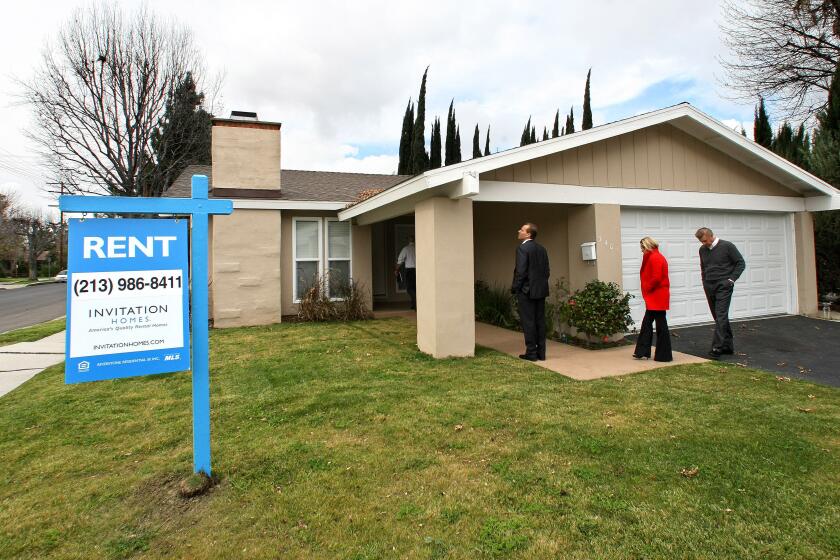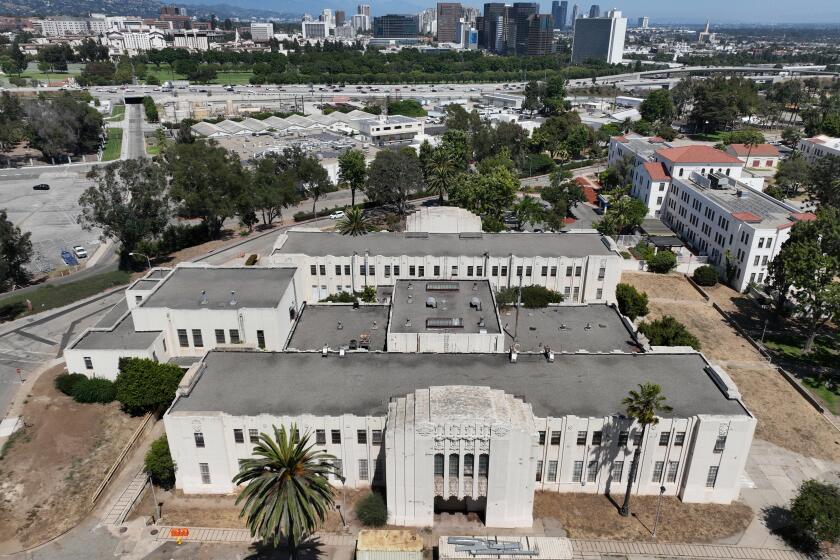Well’s Water Found Unsafe for Any Use
Since 1980, the state has been advising customers of a small water company here to refrain from drinking the water, and now officials say the water is not safe to bathe in, either.
In fact, the state has advised Richwood Mutual Water Co. to close one of its two wells and find another source of water. Richwood, which serves about 200 homes near the center of El Monte, is working out an agreement to connect its lines to draw water from the San Gabriel Valley Water Co. until well contamination is reduced.
Gary Yamamoto, a senior engineer with the state Department of Health Services, said recent laboratory tests showed one of Richwood’s wells to be heavily contaminated with perchloroethylene (PCE), an industrial solvent that in high doses has caused cancer in laboratory animals. Yamamoto said two laboratory tests of water samples from a Richwood well showed PCE at 87 and 110 parts per billion, far above the 4 parts per billion permitted under state guidelines.
Dr. Richard Jackson, a physician who runs the hazard evaluation section of the state health department, said short-term exposure to PCE, which is commonly used in dry cleaning, entails little danger, but a lifetime of cumulative exposure can slightly increase the risk of cancer. The risk of getting cancer from drinking two quarts of water a day containing 4 parts per billion of PCE over a 70-year period is one in 1 million, he said.
When contamination exceeds 10 times that permitted level, Yamamoto said, the state recommends against using the water for any purpose. There could be a health risk from bathing in the water because PCE could be absorbed through the skin or breathed as it gets into the air, he said.
Yamamoto said PCE contamination has been evident for five years in wells operated by Richwood and two neighboring water companies, Rurban Homes Mutual Water Co., with 300 customers, and Hemlock Mutual Water Co., with 200.
The water companies are owned and managed by the property owners in the areas they serve. Residents could try to hook up with larger water companies, but have always preferred to retain their own systems, usually benefitting from cheaper water rates.
Since the discovery of PCE contamination, the state has allowed the three companies to continue delivering water, but has instructed them to advise users either to boil the water before drinking or to buy bottled water.
The advice has been followed by some customers and ignored by others.
For example, George Bucey, president of Rurban Homes, said the health risk has seemed so slight that he has never opted for bottled water. He said he has been drinking the water for 38 years without any ill effects.
Officials at both Rurban Homes and Hemlock said PCE levels have declined in their wells in the past two years. Contamination in Richwood’s wells fell, too, before the recent sharp increase.
Yamamoto said both of Richwood’s wells are contaminated with PCE and the level in one is so high that it no longer makes sense to simply leave the water consumption decision to customers.
Yamamoto said the state stopped short of ordering Richwood to close its worst well but “we recommended strongly that they cease using the water as soon as possible.”
There are more than 60 wells in the San Gabriel Valley with water that contains PCE, TCE (trichloroethylene) and related compounds at levels exceeding state guidelines. Some of the wells are closed; others are producing water that is blended with purer water or treated to meet state standards.
Bonnie Pool, Richwood secretary-treasurer, said the company must pump from both of its wells to produce enough water to serve its customers. The only alternative now, she said, is to hook up with another company.
Michael Whitehead, executive vice president of San Gabriel Valley Water Co., which is based in El Monte and serves 40,000 customers, said arrangements are being made to install a connection and sell water to Richwood on a temporary basis. He said the two water systems can be connected for about $1,000.
A longer-term solution for Richwood’s contamination depends on action at the state and federal levels. The federal Environmental Protection Agency has offered to install an air-stripping tower or carbon filtration system to remove the contaminants from the water before its is delivered to homes, but Richwood or the state would have to pay for maintenance and operation. Assemblywoman Sally Tanner (D-El Monte) last week amended an Assembly toxic cleanup bill to include $4 million to install and maintain treatment systems for Richwood, Rurban Homes and Hemlock.
Tanner said she believes carbon filtration systems should be installed instead of air-stripping towers. The towers drop water down while air is forced upward, releasing contaminants. Tanner said the towers would add to air pollution and would be unsightly, extending 35 feet in the air.
But airstripping towers are one-third as expensive to operate and maintain as carbon filtration systems. The Environmental Protection Agency has estimated the 20-year operation and maintenance costs for airstripping towers for Richwood, Rurban Homes and Hemlock at $624,000 to $726,000, contrasted with $1.8 million to $2.3 million for carbon adsorption systems.
Hemlock Mutual Water Co. has already purchased a carbon filtration system, but it must obtain a permit from the Regional Water Quality Control Board before putting it in operation and is hoping to receive state or federal money to help with the project.
Tanner said that if the state refuses to pay for maintenance and operation of treatment systems, the cost will fall entirely on the 700 customers of the three water companies.
Tanner sent a letter to Kenneth Kizer, director of the state Department of Health Services, asking that the three El Monte water companies receive financial aid.
“El Monte residents are not responsible for the presence of PCE in their drinking water and they should not foot the bill for having it removed from their water,” she said.
The sources of ground water contamination in the San Gabriel Valley have never been identified, although officials have speculated that leaks from underground storage tanks and careless or illegal dumping may have contributed to the problem.
Sign up for Essential California
The most important California stories and recommendations in your inbox every morning.
You may occasionally receive promotional content from the Los Angeles Times.






